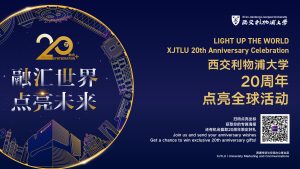19 May 2025
Recently, a paper titled “Traditional Chinese Medicines: Enhancing Supply Chain Management for Industry Sustainability" co-authored by Professor Lujie Chen from the International Business School Suzhou (IBSS) at Xi’an Jiaotong-Liverpool University (XJTLU), and other researchers, has been accepted and published in the JCR Q1 and Tier 1* journal International Journal of Logistics Research and Applications. The study systematically explores how innovative supply chain strategies can enhance quality control, operational efficiency, and sustainable development in the traditional Chinese medicine (TCM) industry.

TCM, as a holistic medical system integrating herbal therapy, acupuncture, and massage, is gaining global attention for its significant therapeutic advantages. The industry's rapid growth in recent years has highlighted challenges in improving quality, optimizing operational efficiency, and achieving sustainable development. The study finds that optimizing supply chain management (SCM) is key to addressing these issues. The research team proposes a strategic framework encompassing three dimensions: industry-level collaboration, supply chain innovation, and process standardization.
At the industry level, establishing a collaborative ecosystem, adopting green supply chain practices, and promoting digital transformation are crucial. A collaborative ecosystem helps balance resource allocation between large pharmaceutical companies and small-scale herbal growers, thereby enhancing overall competitiveness. Green supply chain management integrates environmental practices throughout the entire process of planting, purchasing, production, logistics, and marketing. The application of digital technologies (such as the Internet of Things, blockchain, and big data) enhances transparency, product safety, traceability, and operational efficiency.
At the supply chain level, the study emphasizes the importance of R&D innovation, multi-channel business models, and risk management. R&D efforts that combine traditional medicine with modern technology can develop more innovative treatment solutions. A multi-channel model integrating online sales platforms with offline diagnosis and retail can expand consumer reach and improve market responsiveness. Effective risk management includes comprehensive risk assessment, supplier diversification, and real-time monitoring systems to ensure product quality and supply continuity.
Process optimization is essential for ensuring product quality and consistency. The study points out that strict quality control and standardized processes significantly impact supply chain management effectiveness. Ensuring the authenticity of raw materials, implementing Standard Operating Procedures (SOPs), and conducting rigorous stability testing can guarantee product quality consistency. Standardization in raw materials, formulas, production, dosage forms, and compliance helps ensure product reproducibility, efficacy, and consumer trust.
The study has profound implications for industry practice. Implementing comprehensive supply chain management strategies will bring multiple benefits to the TCM industry: strict quality control and standardized operations ensure product quality and effectively enhance consumer trust; adopting green supply chain practices not only achieves ecological protection but also strengthens brand differentiation and competitive advantage; digitalization and multi-channel models significantly optimize inventory management and improve operational efficiency; a robust risk management system ensures supply chain stability and enhances corporate risk resistance; and building an industry collaborative ecosystem maximizes resource utilization efficiency and comprehensively improves market responsiveness and innovation capabilities. The systematic implementation of these strategies will drive the TCM industry to achieve coordinated improvements in quality, efficiency, and sustainable development.
Overall, this study provides a clear path for TCM enterprises to use supply chain management to enhance performance, achieve sustainable market development, and gain competitive advantages. However, future industry practice still needs to address some key issues, especially establishing a systematic sustainable development evaluation framework, strengthening globalization strategies, and improving reverse logistics management methods. These targeted improvements will further enhance the global influence and sustainable development trajectory of TCM.
Lujie Chen is a full Professor of Management at Xian Jiaotong-Liverpool University. Prof. Chen is Elsevier-Stanford University World's Top 2% Scientists 2024 (the only one in IBSS). She is a Fellow of the Higher Education Academy in the UK and an expert in the fields of supply chain management and business analytics. Professor Chen have published over 60 high-quality and impactful papers in top-tier journals such as the Journal of Operations Management (UTD 24), Harvard Business Review (FT50), International Journal of Operations and Production Management (ABS 4), British Journal of Management (ABS 4), and European Journal of Operational Research (ABS 4) , among others. She has served as a guest editor for special issues of several respected journals such as International Journal of Operations and Production Management, Industrial Marketing Management, International Journal of Production Economics, and Journal of Business Research. She is currently serving as an Associate Editor for the International Journal of Operations and Production Management (ABS 4) and department editor for IEEE TEM (ABS 3) and editorial board for Humanities and Social Sciences Communications (Nature Portfolio,CAS Humanities Q1 & JCR Q1)
International Journal of Logistics Research and Applications (JCR Q1, Tier 1*, IF= 5.446) is an academic journal focusing on the field of logistics and supply chain management, dedicated to publishing original and challenging research with clear applicability to the business world. The journal's papers meet academic journal standards and are aimed at both practitioners and academics. The journal covers all aspects of logistics and supply chain management, including inbound and outbound logistics, materials management, modeling and simulation, decision support tools, inter-enterprise communication tools, collaborative planning, customer relationship management, procurement, mass customization, supplier development, performance management, collaboration and relationship management, environmental and sustainability issues, international logistics operations, training and education, research methodologies, and case studies. The journal is ranked in the JCR Q1 category for the management field in the SSCI. According to the 2024 CiteScore Ranking released by Elsevier (2023), the IJLRA journal is positioned in the Q1 rank across five domains: Management Information Systems, Management Science and Operations Research, Management of Technology and Innovation, Business and International Management, and Strategy and Management.
19 May 2025








